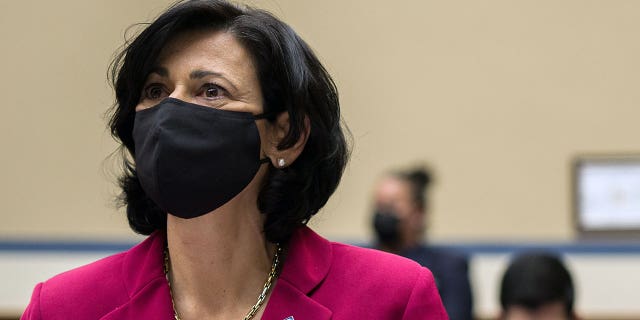Unvaccinated individuals twice as likely to face COVID-19 reinfection: CDC study

President Biden, Gov. DeSantis continue to spar over COVID response
"Fox & Friends" co-host Brian Kilmeade speaks on the political aspects of COVID-19 and critical race theory.
A new Centers for Disease Control and Prevention (CDC) study found that unvaccinated individuals who have had COVID-19 are twice as likely to face reinfection as individuals who have received the vaccine.
The study, published as part of the agency’s Morbidity and Mortality Weekly Report (MMWR), examined hundreds of residents, finding that the unvaccinated individuals had 2.34 times greater odds of reinfection compared with fully vaccinated individuals.
The residents were aged 18 or older and had previous COVID-19 infections in 2020 and experienced a second infection between May and June 2021 – the time period that aligns with the emergence and spread of the delta variant.

April 15, 2021: Dr. Rochelle Walensky, director of the U.S. Centers for Disease Control and Prevention (CDC), wears a protective mask during a Select Subcommittee On Coronavirus Crisis hearing in Washington, D.C.
(Amr Alfiky/The New York Times)
“If you have had COVID-19 before, please still get vaccinated,” said Centers for Disease Control Director Dr. Rochelle Walensky in a statement released Friday. “This study shows you are twice as likely to get infected again if you are unvaccinated.”
“Getting the vaccine is the best way to protect yourself and others around you, especially as the more contagious Delta variant spreads around the country,” she added.
The delta variant has shown to be far more transmissible than other strains of COVID-19; Walensky noted in mid-July that the variant is “spreading with incredible efficiency and now represents more than 83% of the virus circulating the United States.”
However, the CDC stressed that the COVID-19 vaccines remain safe and effective and are the best way to prevent infection.
MMWR also published a study that pointed to the success of the vaccines in preventing COVID-19 related hospitalizations among the highest-risk age groups.
The second study indicated that the Pfizer and Moderna vaccines in adults aged 65-74 were 96% effective in preventing hospitalization – a figure that dropped only slightly to 91% in populations over 75 years in age.
The Janssen vaccine – produced by Johnson & Johnson – is 85% effective in both age groups.
That effectiveness is still more than double the effectiveness of the average flu shot, which in 2019-2020 was 39% effective.
Source: Read Full Article
